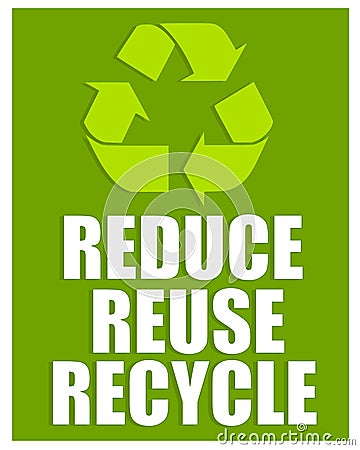“Use it up, wear it out, make it do, or do without”
(New England proverb originally used in 1930′s)
Reduce: The best way to manage waste is to not produce it!
- Plan a shopping list to prevent purchasing on impulse.
- Purchase products that will not go out of fashion quickly.
- Buy products in bulk: Larger, economy-size products or ones in concentrated form use less packaging and usually cost less per ounce.
- Look for items that use little or no packaging.
- Avoid overly-packaged goods. The packaging is a total throw-away, difficult to recycle, and often increases your cost.
- Avoid disposable goods, such as paper plates, cups, napkins, razors, and lighters. Throwaways contribute to the waste problem and cost more, because they must be replaced again and again.
- Buy durable items that are well-built, last a long time, or carry good warranties. They will save you money and landfill space.
- Avoid things made with toxic materials, such as most household cleansers.
- Reduce water use at home.
- Waste less energy on lights and equipment.
- Make two-sided copies whenever possible.
- Maintain central files rather than using several files for individuals.
- Use electronic mail or a main bulletin board.
- Remove your name from mailing lists of materials you no longer want to receive: write to Mail Preference Service, c/o Direct Marketing Assoc., P.O. Box 90008, Farmingdale, NY 11735.
- Use cloth napkins instead of paper napkins.
- Use a sponge, dish cloth, or clean rags, instead of paper towels for cleaning.
- Eat less meat and more plant foods.
- Use a reusable lunch bag or box, instead of throwing away a paper bag each day!
- When you make a purchase, don’t take a bag unless you absolutely need one.
- Rent things you use infrequently instead of purchasing them.
- Use reusable plastic containers for food instead of plastic bags.
- Use rechargeable batteries instead of disposable ones.
- Read books, magazines, and newspapers at the library instead of purchasing them.
- Use plates, cups, and utensils that can be washed instead of ones you throw away.
- Purchase items like juice and detergent in concentrate when possible.
- Avoid buying foods in single serving packages.
Reuse: Be creative and ‘wear it out’!
- Bring a grocery or shopping bag from home when shopping, instead of requesting plastic or paper bags.
- Reuse products for the same purpose: Save paper and plastic bags, use rechargeable batteries, repair broken appliances, furniture, and toys.
- Use unwanted plastic bags to collect garbage.
- Convert scrap paper into memo pads.
- Use your own eating utensils & ceramic mug, instead of disposable ones & paper cups.
- Reuse used glass, metal, and plastic containers as receptacles.
- Clean and reuse ornaments and washable eating utensils for your next festive celebration.
- Use refillable items, e.g., dish-washing liquid, shampoo, stainless steel beverage containers to store water for washing hands when away from home, watering plants, drinking water, etc.
- Use old clothing as rags for cleaning, instead of paper towels.
- Use washable, resealable containers rather than plastic wrap or a one-time container for packing food.
- Store perishable foods (bread, fruits) in the refrigerator, so they last longer.
- Pass old textbooks, story books, childrens’ clothing, and toys to others who can use them.
- Donate good quality but unwanted clothing, blankets, towels, appliances, furniture, toys, and other items to those in need, Goodwill, Salvation Army, or other charitable organizations, or sell them in garage sales or ads.
Recycle: Take used material and process, remanufacture, and sell it as a new product!
- Purchase and use products made from recycled material. Look for the recycling symbol or ask a store representative. The recycling symbol means the product is either made of recycled material or can be recycled. (Many plastic containers have a recycling symbol with a numbered code that identifies what type of plastic resin it is made from. However, just because the container has this code does not mean it can be easily recycled locally.)
- Participate in your community, school, home-goods store, and hazardous waste recycling program. Check to see what they accept, and begin collecting those materials (metal cans, newspapers, paper products, glass, plastics, oil).
- Purchase recycled materials at work for office supply, office equipment, or manufacturing.
- Speak to store managers and ask for products and packaging that help reduce waste, such as recycled products and products that are not over-packaged.
- Use recycled paper for letterhead, copier paper, and newsletters.
- Use both sides of paper for writing, memos, calculations, problem solving.
- Recycle used envelopes, boxes, gift bags, wrapping paper, and packaging.
- Deposit recyclable items into designated recycling bins.
- Hazardous waste recycling is necessary for batteries which often contain heavy metals like mercury, lead, cadmium, and nickel, many cleaning products, oils, paints, pesticides, and tires.
- Return lead-acid car batteries and used motor oil to almost any garage or auto-supply store that sells them or a community-collection event.

Comments on this entry are closed.